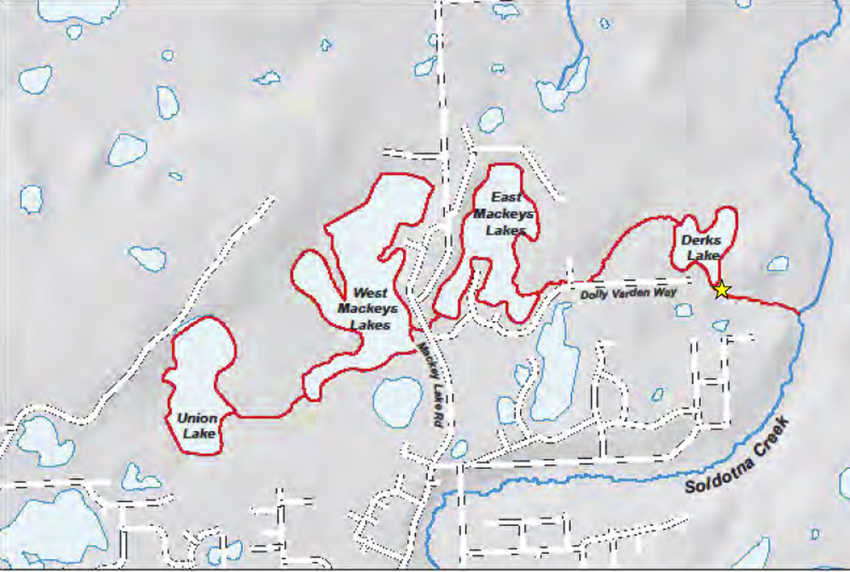Ice fishermen in East and West Mackey lakes, Derks Lake and Union Lake will be limited to two closely attended lines this winter.
The Alaska Department of Fish & Game has successfully eliminated northern pike from the lakes. In order to give native fish a chance to repopulate, it is reducing the number of permitted lines from five to two, according to an emergency an emergency order issued Tuesday.
The four lakes were treated with the piscicide rotenone in 2014 as part of a Soldotna Creek drainage-wide effort to eliminate northern pike — an effort that has been largely successful so far, said Rob Massengill, a fisheries biologist with Fish & Game in Soldotna.
After the lakes were treated, biologists monitored the lakes in two primary ways — gillnets and a new tool called environmental DNA, or eDNA. Gillnets were set in the lakes all winter, which added up to thousands of angler hours, and pulled up in the spring. When they were retrieved, they had no pike in them, Massengill said.
“We have not seen a pike or heard of anybody catching one this year,” Massengill said. “In most of the lakes, we put in nets as the lakes froze last fall and let them fish all winter long. We pulled them the day the ice went off the lakes. None of the nets had any fish in them.”
The eDNA is keyed to a target species’ specific genetic marker — in this case, northern pike. Fish & Game has been working to develop it since 2013, and this year was the first time it was field-tested, Massengill said. Fish biologists have used it in the past in the Great Lakes region to help eliminate invasive Asian carp, with a fair amount of success.
The biologists collected 200 water samples from the lakes to test for the pike marker. Of the 200, only three came up positive. Two of those three likely came from fish carcasses that they saw frozen in the ice, and the other came from a lake that was still active with rotenone, where no fish could survive. In combination with the gillnet surveys, they are fairly confident that the lakes are pike-free, Massengill said.
“We had very, very low detection rates for pike DNA in the water, and we’re pretty confident that we can attribute that to pike carcasses that hadn’t degraded,” Massengill said.
With that in mind, Fish & Game staff began restocking the lakes with native fish from Soldotna Creek in June. Rainbow trout, Dolly Vaden and juvenile coho, among others, were collected from Soldotna Creek to be moved into the lakes — approximately 30,000 fish, all told.
“We like to say rescued,” Massengill said. “They’re not exposed to the pike predation or the rotenone in the lakes. There will definitely be thousands of fish being rescued this spring.”
However, the number of sportfish available for fishing is still very small. Thus, Fish & Game allows ice fishing on the lakes this winter but no retention. There is some evidence that the fish are already reproducing, but they still need more time to repopulate to a sustainable level, Massengill said.
There is some overlay of language in the specific emergency order — one portion says that no fish retention is allowed, while the statutory regulation beneath it says that only pike retention is allowed. That is because Fish & Game is convinced that there are no pike in those lakes, said Jason Pawluk, a fishery biologist with Fish & Game in Soldotna.
“Obviously, if anyone catches a pike, we want them to keep it because it’s not native to the peninsula,” Pawluk said. “The fish that were transplanted there, the vast majority of them are mostly juvenile fish. Although we are allowing sportfishing to take place on those lakes, if anyone does catch any fish, the fish that they do catch will be very small.”
The project will continue in both 2016 and 2017 as Fish & Game treats the main stem of Soldotna Creek with rotenone. Biologists will monitor the amount of rotenone reaching the Kenai River with caged fish, and potassium permanganate stations — which can neutralize the chemical — are in place in case the levels become too high in the river, Massengill said.
They will be working with the landowners to access Soldotna Creek for the next two seasons, both to collect fish and to treat the creek itself.
Letters are going out and department staff will contact property owners near the creek, he said. “We appreciate any cooperation they can give us because we’re going to need access to the creek in a number of locations,” Massengill said. “If people want to help, that would be very much appreciated.”
For now, anglers are still allowed up to five closely attended lines on Sevena Lake, another lake in the Soldotna Creek drainage, and the unnamed lakes on Tote Road south of Soldotna because they still have northern pike populations.
Reach Elizabeth Earl at elizabeth.earl@peninsulaclarion.com.

